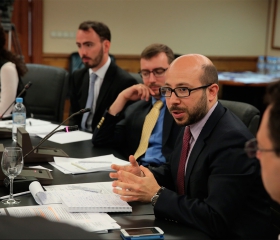
The annual treaty compliance report released by the United States in July contained a much anticipated statement that accused Russia of noncompliance with the terms of the Intermediate Nuclear Forces (INF) Treaty. Reports about Russia’s noncompliance first surfaced in July 2013, but it took the United States a year to make its finding public. A violation of a major nuclear arms control agreement is, of course, a serious matter, so it hardly surprising that the U.S. administration has found itself under pressure to mount a forceful response. Some proposals went as far as to suggest that the United States should withdraw from the New START treaty that limits strategic nuclear arms. Even though this was an outlier, most experts did advocate strong measures – from boosting NATO conventional capability in Europe or its ability to detect cruise missiles to exploring a feasibility of building new U.S. intermediate-range missiles. The general thrust of these proposals appears to be the same: force Russia to reverse its course and return to full compliance with the treaty.
Before we can judge the severity of the violation or assess the proportionality of a response, it is important to consider the facts of the case. Unfortunately, the compliance report did not provide any details about the nature of the violation other than to say that it involves a ground-launched cruise missile (GLCM). Most of the early reports suggested that the missile in question is the R-500 GLCM, first tested in 2007 and deployed with the Iskander short-range missile system since last year. However, the R-500 does not fit the profile – the United States told its NATO allies that the flight tests that triggered the accusations of violation began in 2008 and that the missile has not been deployed yet. Indeed, U.S. officials informally confirmed that the noncompliance issue is not related to the Iskander. Russia, of course, has more than one missile under development and it is possible that there is another GLCM in the works, but it is more likely that the tests in question constitute a technical violation of the treaty terms that will be extremely difficult to prove. It might be even more difficult to make Russia take a visible corrective action.
It is true that Russia has been fairly open about its unhappiness with the INF Treaty limitations, pointing out that its neighbors, who do not face similar constraints, are actively building their own intermediate-range missiles. The concern about the neighbors is unlikely to be genuine – whether or not they are building their own missiles, for Russia the real goal is to regain the capability to hold the countries within the INF Treaty range at risk. In any event, it appears that the Kremlin has already made the decision to do away with the treaty. Knowledgeable sources say that quite a few new weapon development programs pay no attention to the treaty limitations, apparently in anticipation of its demise. At the same time, Russia has tried to play it safe, exploring loopholes in the treaty rather than openly breaching it. It has developed what seems to be an intermediate-range ballistic missile, known as RS-26 Rubezh, but tested it at a range that would qualify the missile as intercontinental.
Given the great lengths Russia went into to ensure that the RS-26 missile would be in compliance with the letter of the treaty, if not its spirit, it is unlikely that the cruise missile issue is an open and shut case. It is telling that it took the United States two years to confront Russia about the violation. Russia, of course, disputes the accusations and insists that it has provided the United States with a satisfactory explanation of its actions. Russia also stated that it has its own concerns about U.S. compliance with the treaty. Although these seem to be rather obscure technical points that fall into the treaty grey area, they are not entirely without merit.
All this creates a rather complicated situation that does not lend itself to easy solutions. This is not to say that the U.S. accusations are unsubstantiated, but if they refer to a technical violation, an excessively strong response would only make the situation worse. It is clear that nothing we have seen so far justifies such a radical step as pulling out of the New START treaty (not to mention the INF Treaty itself). Threatening Russia with a symmetrical response, similar to the NATO two-track decision to proceed with deployment of its own intermediate-range systems while opening talks on their elimination that was taken during the original INF crisis in the 1970-1980s, is unlikely to work either. Unlike the Soviet Union, the current Russian leadership strives for confrontation and the circumstances that made the INF Treaty possible simply do not exist today.
The U.S. administration appears to have taken the right approach. Facing a prospect of Russia’s unilateral withdrawal from the INF Treaty, it went public with the noncompliance finding, judging correctly that it will raise the political cost of the withdrawal. This is probably the strongest action that the situation warrants at this point. Whether this would be sufficient to prevent Russia’s pulling out of the treaty is another matter. President Putin openly said that Russia should be free to leave arms control treaties if it decides to do so. This attitude to international agreements is not particularly new or surprising – note that this particular statement was made during a visit to the recently annexed Crimea. In fact, Russia may well decide that there will be no better time to pull out of the INF Treaty. Moscow’s international reputation is already in tatters after the incursions into Ukraine, so the political cost of the withdrawal may seem small compared to what Russia is already paying. This, however, does not mean that this cost is insignificant, so putting pressure on Russia may help deter it from taking that last step.
There is little doubt that in the end keeping the INF Treaty intact will serve Russia’s national security much better than rushing into deployment of new missiles aimed at its neighbors. Unfortunately, it will probably take a long time for this idea to take hold in the Kremlin. Meanwhile, the best that the West can do is to keep calm and to avoid aiding Russia in its effort to unravel the treaty that is rightly regarded as one of the key elements of the post-cold war security structure.
The opinions articulated above represent the views of the author(s), and do not necessarily reflect the position of the European Leadership Network or any of its members. The ELN’s aim is to encourage debates that will help develop Europe’s capacity to address the pressing foreign, defence, and security challenges of our time.



